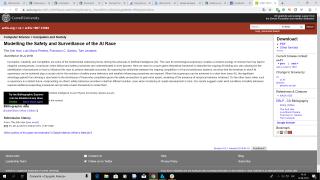
Innovation, creativity, and competition are some of the fundamental underlying forces driving the advances in Artificial Intelligence (AI). This race for technological supremacy creates a complex ecology of choices that may lead to negative consequences, in particular, when ethical and safety procedures are underestimated or even ignored. Here we resort to a novel game theoretical framework to describe the ongoing AI bidding war, also allowing for the identification of procedures on how to influence this race to achieve desirable outcomes. By exploring the similarities between the ongoing competition in AI and evolutionary systems, we show that the timelines in which AI supremacy can be achieved play a crucial role for the evolution of safety prone behaviour and whether influencing procedures are required. When this supremacy can be achieved in a short term (near AI), the significant advantage gained from winning a race leads to the dominance of those who completely ignore the safety precautions to gain extra speed, rendering of the presence of reciprocal behavior irrelevant. On the other hand, when such a supremacy is a distant future, reciprocating on others' safety behaviour provides in itself an efficient solution, even when monitoring of unsafe development is hard. Our results suggest under what conditions AI safety behaviour requires additional supporting procedures and provide a basic framework to model them.